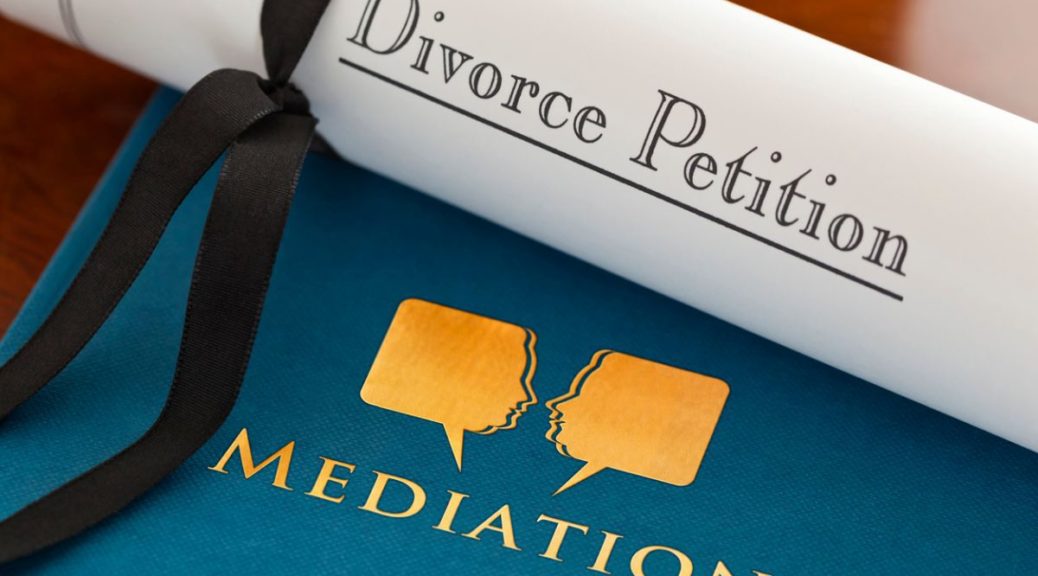There are many reasons to file a divorce. Take Henry and Martha. After raising four children during their 31-year marriage, they decided to join the “gray divorce” crowd. Jake and Lucy, married four years ago, had one child together before Jake’s infidelity and substance abuse drove them apart. Both of these couples had some heavy decisions ahead. As their cases progressed, they had to decide whether settlement or litigation was best for their divorce.
Two Pathways.
The parties in most divorce cases are able to reach a divorce settlement agreement. The couple and their attorneys may negotiate privately or go to mediation. Though it is similar to a trial in that both parties present their side, mediations proceed very differently.
For one thing, agreements reached in a mediation are confidential. Court proceedings are not, although courts can restrict who can view divorce court records. In Jake and Lucy’s case, privacy was a big concern. Lucy did not want Jake’s infidelity and drug addiction publicly aired.
Unfortunately, trial became a necessity for Henry and Martha. A lifelong homemaker, Martha had never worked outside the home. She expected spousal support to continue for some time. Henry, however, felt she deserved nothing because he had been the family’s breadwinner for their entire marriage. Both stubbornly stuck to their positions and refused to compromise.
When Is Settlement Right?
Some couples are in a position to settle their differences quickly. For them, settlement through negotiations or mediation typically is faster than going through the court system. They don’t have to wait for space to clear on a court docket to schedule hearings.
Divorce strains family relationships. Mediation may be less destructive on those relationships because they are typically less combative than trials.
Couples going through a divorce may have financial problems. Mediations and settlement negotiations are usually less expensive than going to trial.
When a settlement agreement is presented to the court, the judge will make sure the document complies with California law. However, many of the agreements contained in the settlement agreement do not require a judge’s scrutiny. Couples may hammer out agreements that suit them, but that most judges would not arrive at.
If negotiations and mediation fail, divorce proceedings go to the next level.
When Is Litigation the Best Option?
Some parties may be unable to resolve their issues without court intervention. So, they settle in for the long haul. They may be expected to attend several hearings or even participate in a trial that lasts for days.
Going to trial sounds terrible! So why do some couples end up battling it out in a courtroom?
Divorces with more complex issues are more likely to go to trial. What makes a divorce more complex? Among other things, disputes over property division that can’t be overcome. Inability to agree on hot issues like child custody or spousal support could end up in a courtroom.
Trial may be necessary if domestic violence or child abuse is involved. A judge has the authority issue orders that protect the abused spouse or child, something neither an attorney nor a mediator can do.
Some spouses make unreasonable demands or have unreasonable expectations. In cases where this is an issue, unfortunately, a trial usually becomes necessary.
Final Thoughts.
The attorneys at the Law Offices of Judy L. Burger can help, whether your case is settled or goes to trial. Call us at 415-293-8314 to schedule a private appointment or visit our website. We maintain offices in San Francisco, Marin County, Santa Barbara, Ventura/Oxnard, San Jose, Gold River (Sacramento), and surrounding communities.







 Many clients ask us what they can expect in mediation and we are careful to explain the ins and outs and the mechanics of the mediation process. Mediation can be a very positive experience for those who are of a mind to compromise and who are fortunate to have the help of a truly unbiased and experienced mediator. Knowing the basics ahead of time often helps alleviate our clients’ anxiety.
The basic idea behind mediation is that the two parties, along with their attorneys, sit down with a neutral third party and attempt to reach an agreement on various issues in a divorce. The discussions that take place during mediation are kept confidential and are prohibited from being used if the matter eventually winds up in court. This arrangement is intended to allow for the worry-free sharing of ideas and offers.
One fact worth taking to heart is that mediators are referred to as neutrals because that is the essence of their role – to maintain complete neutrality regardless of the facts of a case. Maintaining neutrality can be a challenge when facts weigh heavily in favor of one party, but neutrality is absolutely essential. If one spouse perceives a lack of absolute neutrality, the mediation is unlikely to be successful.
Another fact to remember is that mediation can only result in an agreement when both parties engage in mediation with a good faith intent to be open minded and willing to compromise to find the middle ground in every disputed issue.
Being open minded and willing to compromise may sound reasonable enough, but often the problem is that by the time one or both spouses decide to file for divorce, good faith is long gone. A spouse who was the victim of neglect or deceit may not be able to forgive and forget. In our family law practice, we deal with highly contested cases where emotions are frequently too raw for a mediation to be successful.
If you are facing mediation, the
Many clients ask us what they can expect in mediation and we are careful to explain the ins and outs and the mechanics of the mediation process. Mediation can be a very positive experience for those who are of a mind to compromise and who are fortunate to have the help of a truly unbiased and experienced mediator. Knowing the basics ahead of time often helps alleviate our clients’ anxiety.
The basic idea behind mediation is that the two parties, along with their attorneys, sit down with a neutral third party and attempt to reach an agreement on various issues in a divorce. The discussions that take place during mediation are kept confidential and are prohibited from being used if the matter eventually winds up in court. This arrangement is intended to allow for the worry-free sharing of ideas and offers.
One fact worth taking to heart is that mediators are referred to as neutrals because that is the essence of their role – to maintain complete neutrality regardless of the facts of a case. Maintaining neutrality can be a challenge when facts weigh heavily in favor of one party, but neutrality is absolutely essential. If one spouse perceives a lack of absolute neutrality, the mediation is unlikely to be successful.
Another fact to remember is that mediation can only result in an agreement when both parties engage in mediation with a good faith intent to be open minded and willing to compromise to find the middle ground in every disputed issue.
Being open minded and willing to compromise may sound reasonable enough, but often the problem is that by the time one or both spouses decide to file for divorce, good faith is long gone. A spouse who was the victim of neglect or deceit may not be able to forgive and forget. In our family law practice, we deal with highly contested cases where emotions are frequently too raw for a mediation to be successful.
If you are facing mediation, the  In a perfect world, mediation can be a fair way for a divorcing couple to compromise and settle disputes over child custody and visitation or decide how to divide marital property. But, circumstances are not always ideal and an unfair mediation session can leave a party feeling used, intimidated, and hopeless.
In California, parties arguing over custody must attend mediation before a judge will hear their case.
Trouble arises when the husband or wife feels the mediation process is weighted in the other spouse’s favor. Though many family court mediators have significant training and experience in family law, mediators – like lawyers and judges – are still human. A mediator may hold a bias and not realize it.
Other instances where a person can feel shortchanged by mediation are when one spouse is more educated about the divorce process than the other (seeming to have inside information) or when intimidation was present in the marital relationship.
One way to overcome these potential snags is to be well prepared for mediation. Educate yourself about the divorce process and California’s law and policy regarding family separation issues. Make a list before mediation of which points are negotiable and which are not.
Finally, although your attorney may not be permitted to sit through all of the mediation process with you, your attorney will prepare you for this process prior to your appointment. If you have any doubts about the quality of the mediator, about your knowledge of family law, or if you feel intimidated in any way by your spouse or the process itself, then the best court of action is to show up for mediation equipped with a strong advocate on your side.
At the
In a perfect world, mediation can be a fair way for a divorcing couple to compromise and settle disputes over child custody and visitation or decide how to divide marital property. But, circumstances are not always ideal and an unfair mediation session can leave a party feeling used, intimidated, and hopeless.
In California, parties arguing over custody must attend mediation before a judge will hear their case.
Trouble arises when the husband or wife feels the mediation process is weighted in the other spouse’s favor. Though many family court mediators have significant training and experience in family law, mediators – like lawyers and judges – are still human. A mediator may hold a bias and not realize it.
Other instances where a person can feel shortchanged by mediation are when one spouse is more educated about the divorce process than the other (seeming to have inside information) or when intimidation was present in the marital relationship.
One way to overcome these potential snags is to be well prepared for mediation. Educate yourself about the divorce process and California’s law and policy regarding family separation issues. Make a list before mediation of which points are negotiable and which are not.
Finally, although your attorney may not be permitted to sit through all of the mediation process with you, your attorney will prepare you for this process prior to your appointment. If you have any doubts about the quality of the mediator, about your knowledge of family law, or if you feel intimidated in any way by your spouse or the process itself, then the best court of action is to show up for mediation equipped with a strong advocate on your side.
At the